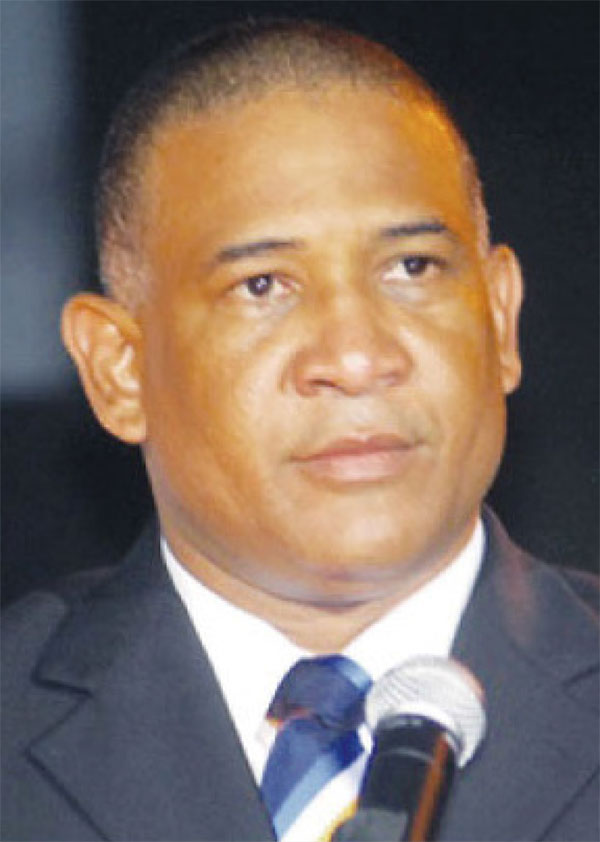‘The CIP Board has no authority to demand the things that its former Chairman now says should be demanded for a developer’

AS we discussed the soul of our nation in Part 1 last week, we reminded ourselves of the reasons for objecting to the sale of our passports no matter how immaculately that sale was packaged and promoted to us. Those reasons were firstly the loss of our identity, and then the social mayhem that the CIP will unleash.
And as we remain confronted with issues arising from the agreement between Desert Star Holdings and our government, one of the only things of which we are certain is that the success of this project depends on the CIP and the sale of our passports. One of the other things which has become apparent is that that “race to the bottom” described by Prime Minister Gonsalves of St. Vincent is not restricted to competition among our various countries, but it includes competition among our political parties as well.
We will look more closely at the Desert Star Holdings proposal, but before doing so, we must continue to look at ourselves, as, despite the recent bickering over this project by the Government and Opposition, the CIP scheme was passed in the House of Assembly with the support of both of those parties. Recently we heard squeals from the opposition, who when in government established the CIP, that the Desert Star proposal could lead to the influx of 40,000 Chinese nationals to our shores. On this count the opposition is correct, but their protests then, as now, are completely lacking in merit. This is their creation.
Last August 3, following the signing of the initial “agreement” between Government and Desert Star Holdings, the Opposition held a news conference voicing their concerns with respect to that “agreement”. Presented by Dr. Ernest Hilaire for the most part, Dr.Hilaire confirmed that he was one of those persons who initially promoted this scheme, while also indicating that there were about eight points on which the Opposition found objection to the DSH agreement. Dr.Hilaire spent some time addressing his concerns regarding one of those, and that was the need for the investor to present his “financials” to the CIP in order to obtain approval for the development.

In making his concerns known, Dr.Hilaire, who was the first Chairman of the CIP Board, suggested that when submitting a proposal to the CIP a developer was required to indicate the amount of his own money which he intended to invest in the project, (his equity), as well as show the project’s profitability. Dr.Hilaire went further to suggest that it was only at that point, after having reviewed the developer’s financials, that the CIP would determine the number of passports which it would allow a developer to sell to finance the project.
While these statements may appear to be knowledgeable, there is however only one problem with the claims now being made by the former Chairman, and that is that there is no basis at all for his making them as none of these supposed requirements are contained in the Citizenship by Investment Act of 2015, or in the Regulations, original or revised, accompanying this Act. The CIP Board simply has no authority to demand the things that its former Chairman now says should be demanded from a developer. To allow readers to make their own determination, the relevant sections of the Act are reproduced.
The CIP Act makes reference to a “qualifying investment”, and Clause 2 (1) of the Preliminary Section states that “a qualifying investment means cash or an investment in bonds, land or enterprise as may be prescribed by Regulations that in the opinion of the Minister brings substantial benefits to Saint Lucia”. Regulation 8 (1) of the Regulations provides for real estate projects to be included as qualifying investments, and these are required to satisfy Regulation 8 (2) which states that “the minimum investment for each category of qualifying investment, as approved by Cabinet, are set out in Schedule 2.” Schedule 2 sets that minimum qualifying investment in a real estate project as being US$300,000.
With respect to the scrutiny of an applicant’s financial resources, Clause 32 of the Act states that: “For the purpose of a qualifying investment under this Act, an application may be considered when all the requisite criteria in relation to financial resources are satisfied by the applicant pursuant to such guidelines contained in the Regulations.” For emphasis, Clause 32 of the CIP Act states that the guidelines applicable to the Act are to be found in the Regulations to the Act.
Regulation 7 of the Regulations to the CIP Act indicates the “Qualifications, general requirements and procedures for Citizenship by Investment”, and Regulation 7 (2) gives the CIP Unit “the right to require additional documents to establish whether an applicant satisfies the mandatory qualification criteria, including information pertinent to financial resources and qualifying resources.” Then, Regulation 7 (3) of the original regulations (now deleted), states that the applicant shall provide (a) “a sworn affidavit to declare financial resources of at least US $3,000,000; and (b) relevant supporting documents, in support of the declared financial resources and source of funds”.
There we have the limit of the CIP Unit’s authority under the CIP Regulations in force when Dr.Hilaire made his objections known in August 2016: to ensure that the minimum investment in a real estate project is US$300,000, and to ensure that individual investors have financial resources of at least US$3,000,000.
Yet, a little over two months after the Regulations were assented to by the Senate on September 2, 2015, on November 30, 2015 the CIP Unit published its own “guidelines” which provide fifteen conditions which it requires that a real estate project should satisfy. Among these are: “Be predicated on clearly commercial, operational and financial proposals particularly where government incentives and public sector facilitation are required”; “Be transparent and able to withstand full legal, financial, economic and ethical scrutiny”; “Have clearly determined source of funds and not be reliant on speculation”.
In publishing those “guidelines”, the CIP Unit moved from the disingenuous to the absurd, as not only are “guidelines” in and of themselves un-enforceable, but the Unit further qualifies its published “guidelines” by distinguishing those that must be followed, i.e. those contained in the Regulations, from its own guidelines which it says that a developer “should” follow. With even the CIP Unit recognizing that it has no authority to demand that a developer satisfy the requirements listed in the paragraph above, on what basis was Dr.Hilaire demanding the “financials” from Desert Star Holdings, and on what basis was he requiring that DSH have equity in the project, or that DSH shows that the project is commercially viable?
Or, are we to believe that a change in the location of Dr.Hilaire and the SLP, from Government to Opposition, has afforded them the proper viewpoint from which to address this CIP atrocity which they have inflicted on the country?
Clause 40 of the CIP Act gives the Minister the power to make regulations for the purposes of giving effect to the provisions of the Act, but, while regulations have been made to include real estate projects as “qualifying investments” and regulations have been made to govern the investment by individuals in these projects, no regulations have been made with respect to the definition of these projects themselves or the “guidelines” which Dr.Hilaire now wishes to impose on DSH.
There is probably good reason however that these CIP “guidelines” have not been prescribed by law as we know that none of these CIP projects are commercially viable, and all depend on the sale of our passports for financing. Putting those CIP “guidelines” into law would thus eliminate all prospective CIP “developers” as the requirements in those “guidelines” cannot be satisfied. Even Dr.Hilaire’s requirement that “developers” have equity in these CIP projects is merely a distraction, as, by his own exposition, this is probably the easiest requirement for an astute developer to bypass.
What the architects of this CIP have designed, then, is a regime governing the sale of our passports which is silent on one of the principal mechanisms by which this sale might be achieved, real estate projects, a regime which is silent on the requirements that these projects must themselves satisfy in order to receive approval.
The CIP Board has leapt head-first into this vacuum left by the law and has published its own “guidelines” which it claims are subject to Regulation 10 and Schedule 3 of the CIP Regulations. Too smart by half, and then some, as this is a meaningless claim. It is meaningless as the CIP Unit is always subject to the CIP Act and to all the Regulations governing this Act, while the Regulations themselves only authorize the CIP Unit to issue “guidelines” in three circumstances, namely: Regulation 5 (2) (d) which authorizes the CIP Board to issue guidelines with respect to the promotion and advertising of the CIP, Regulation 6 (b) which authorizes the CIP Board to issue guidelines which must be followed by marketing agents with respect to the application process for Citizenship, and Regulation 10 (5) (d) which permits the CIP Board to issue guidelines with respect to when a real estate project is considered to have commenced.
But, having published its own “guidelines” in addition to those required by law without having any authority to do so, the CIP Unit now requires a potential developer to engage in “back-room” negotiations with the CIP Unit, supposedly to satisfy a set of financial conditions which are impossible to be satisfied, before a project can receive approval. Nobody involved in the design of the CIP Act, the Regulations, or involved in the establishment of the CIP Board and CIP Unit apparently recognizes the stench that emanates from this requirement, and so the former Chairman of the CIP Board, Dr.Hilaire, relies on it to challenge the acceptability of the DSH project.
Not satisfied with having sold us for a pittance, the architects of this CIP have now become an authority unto themselves, and we shudder to think just who the Minister responsible for the approval of real estate projects under Regulation 10 (1) of the CIP Regulations would have been if the current Opposition had retained office in the last elections.
But we have been sold before, over a few hundred years, and then as well by some of our very own who themselves achieved great prominence and wealth by doing so. As before, we will resist this new desecration with every fibre available, and in this time, down to the last keystroke. Because:
“Somebody tiefing the soul of this nation, and we, yes you and me, we have to stop this conspiracy” (Gypsy). More next week.


![Hilaire [Photo: Stan Bishop]](https://thevoiceslu.com/wp-content/uploads/2015/09/Hilaire-mid.jpg)












I salute the theme of your conversation. Now if a conduit of its understanding can be engineered to spark the upper primary and secondary students…….VOILA you will have secured a formidable battalion of NATIONAL PATRIMONY defenders….
To thank you for focusing on this important national concern may I share an item on my GYM workout circuit playlist :
https://www.youtube.com/watch?v=mABuS9eSWnQ
Live long and prosper.
This CIP garbage for St. Lucia is borne from a deficit of ideas, disrespect for the citizens and hubris. Its chief proponent knows that St. Lucians detest that insidious giveaway. Has not considered the implications in a meaningful manner. He feels comfort in diving to the floor for the coins.